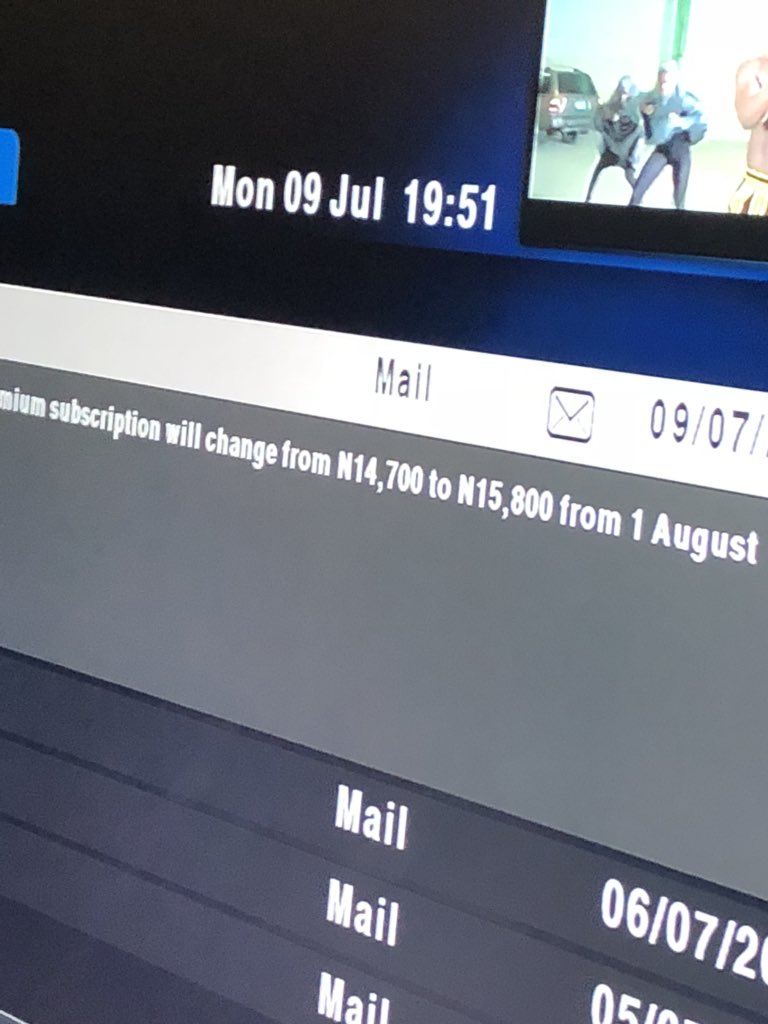Multichoice Nigeria, owners of Digital Satellite television (DSTV), have announced that there will be an increment in the prices of DSTV bouquet monthly subscription with effect from August 1, 2018. Although Multichoice is yet to release an official statement, the new price was announced through SMS notifications and pop up messages on DSTV decoders of millions of subscribers.
The DSTV Premium package has increased from N14,700 to N15,800, while Compact Plus’s rise from N9,900 to N10,650 which is an estimated 7.4 percent increase. However, the increment will see an estimated 5.2 percent increase in other bouquets. DSTV subscription on Compact bouquet will rise from N6,300 to N6,800; Family from N3,800 to N4,000 and on Access, N1,900 to N2,000.

This development comes barely a year after current prices of the bouquet were increased in May 2017, generating public outrage as customers took to social media to vent over what many have called exploitation from the South African franchise. It is also the ninth time the prices of DSTV bouquet will go up since it was first increased in 2009, and the third time since it announced a 20 percent increase on all its bouquet in 2015. Many customers are worried that despite the economic downturn, the company has continued to take advantage of users without cogent reasons.
Although the increment may not come with new content or channels, some users have attributed it to the return of Italian Seria A football on DSTV. This new broadcasting right will obviously come with a price since viewers will be able to enjoy the Italian elite league which was previously not part of the services.
In 2017, customers threatened to boycott the services of DSTV when an increment was announced. However, the company, through its public relations officer, swiftly issued a press release that the increment was as a result of the review of its business operations.
“We announced last year that we would do everything possible to hold the price barring any extreme factors. However, all our content is purchased in dollars and although we have done everything possible to hold the prices even with the price of everything else going up, we are now left with no choice but to adjust our subscription prices from May 1,” said John Ugbe, Managing Director, Multichoice Nigeria, in justification of the previous increment in 2017.
Growing Concerns
With the country’s current economic challenges and corresponding government policies on consumer protection in Nigeria, the recent increase resuscitates the debate on the need for a home-grown PayTV or government intervention in Satellite TV. Analysts have argued that the monopoly enjoyed by Multichoice has made it emboldened to dictate the pace of the market, with constant fears that it might increase its subscription every few months.
With the increment coming just about a year after some changes were made in old prices, there are questions about why an indigenous terrestrial TV with high-quality services has not emerged since the fall of HiTV. This, many social commentators believe, will lessen the company’s monopolistic power.
Over the years, DSTV has continued to hold sway over the Nigerian market as the preferred choice of Nigerians even with the emergence of its sister GOtv, StarTimes and KweseTV. Nigerians believe the emergence of a strong competitor in the industry will reduce its monopoly and exploitation through monthly subscriptions.
In 2017, there was a frenzy on social media with the announcement of the launch of an indigenous satellite TV, TSTV which many people believed would wrestle power from the South African Pay TV giant and hijack its teeming customers. However, TSTV has since failed to break into the market despite the national attention it got before its launch which has made Nigerians call for a more serious competitor.
No doubt, the competitive edge DSTV has in the market has propelled it to improve service and widen the market. However, like the South African telecommunication giants – MTN which has come under public criticism for the perceived exploitation of the citizens of Africa’s most populous country, more criticism will continue to rent the air over its recent decision.








